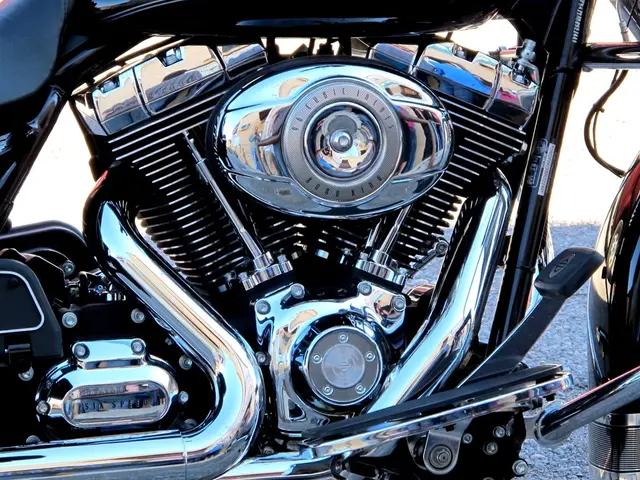Revised article on the impact of tariffs on handheld gaming companies
Potential import tariffs could pose a threat to gaming handheld devices.
Tariffs are wreaking havoc on the tech industry, and that includes the world of handheld gaming. On Tuesday, Anbernic, a China-based handheld gaming company known for its Game Boy clones, announced it was suspending all shipments to the U.S. due to heavy tariffs from the Trump administration.
"Due to changes in U.S. tariff policies, we will be suspending all orders shipping from China to the United States starting today," said Anbernic in a statement. They recommended prioritizing products shipped from their U.S. warehouse, which are currently not affected by import duties.
While losing access to Anbernic handhelds might not be a major blow for the masses, the bigger issue lies in the potential impact of tariffs on smaller handheld gaming companies.
The struggling smaller handheld gaming companies
Smaller companies like Anbernic, which rely heavily on Chinese manufacturing, are the most vulnerable to tariffs. These companies typically have smaller profit margins and might struggle more to absorb increased costs.
If tariffs continue to persist, these smaller companies might have to increase prices or reduce production to stay afloat or even find alternative manufacturing locations to bypass the tariffs.
Nintendo, though it hasn't adjusted prices on the Switch 2 yet, has suggested that things could change at any moment, and companies like Ayaeno, which make handheld gaming PCs and are both headquartered and based in China, could experience more significant fallout.
Retro gaming handhelds might also suffer. Retro is another popular handheld device maker, which has also been impacted by tariffs and has been rushing to ship devices to the U.S. Even companies like Analogue which make the premium-feeling Game Boy clone - the Pocket - which is headquartered in San Francisco, could feel the heat since the devices are still manufactured in China.
Whether any of these companies will be affected as severely as Anbernic remains to be seen, but the message is clear: tariffs have seeped into the world of handheld gaming, and smaller companies might be caught in the storm.
The potential future of tariffs on handheld gaming
The ongoing tariff situation remains uncertain, with potential fluctuations affecting the gaming industry. Larger companies with the necessary resources to adapt quickly will likely weather this storm best.
For example, Nintendo has already shifted production from its China factory to a Vietnam-based one to diversify its production, meaning it can continue producing devices without heavy tariffs.
Smaller handheld gaming companies, however, face a riskier future. They may have to bear the burden of higher prices or dip into their profits to keep their devices available and affordable. But with companies like Analogue planning to make their devices in the U.S., there's a glimmer of hope for a tariff-free handheld gaming future.
A quick glimpse into the modular laptop landscape
In a somewhat related note, bigger players in the tech world like Framework have begun exploring new ways to bypass tariffs. Framework laptops, which offer a high degree of customization through their modular design, are looking to manufacture in the U.S. to avoid tariffs.
This moves toward local manufacturing could spell good news for the tech industry as a whole, with more companies considering alternative manufacturing locations to avoid the strain of tariffs.
Wrapping up
Tariffs have cast a dark cloud over the world of handheld gaming, particularly for smaller companies. The ongoing tariff situation remains uncertain, but for now, it's crucial for smaller handheld gaming companies to stay agile and adapt quickly to changes in trade policies to remain competitive.
If you're a fan of retro gaming or just want to support innovation in the handheld gaming space, now might be the time to invest in a device from companies like Analogue, which are making efforts to bypass tariffs by manufacturing locally. Let's hope this trend catches on, ensuring a tariff-free future for our favorite handheld gaming devices.
MORE FROM our website
- Building a better laptop: Framework's modular laptop is designed to last
- Framework Laptop review: Makes your old laptop feel brand new
- Framework's modular laptop offers sustainability, versatility, and community
- Laptops like the Framework, which boast a modular design, might be the future for evading tariffs in the tech industry.
- The Framework laptop, known for its high degree of customization, is planning to manufactore in the US to dodge tariffs.
- Companies that are exploring new ways to bypass tariffs, such as Framework, could potentially spread a trend towards local manufacturing in the tech world.
- In the realm of handheld gaming, smaller companies are advised to remain agile and respond swiftly to changes in trade policies to stay competitive.
- To support innovation in the handheld gaming sector and enjoy retro gaming devices, it may be wise to invest in companies like Analogue, which attempt to bypass tariffs by manufacturing locally.
- With an unpredictable tariff situation, it's crucial for smaller handheld gaming companies to adapt quickly to stay afloat and remain competitive.
- Handheld gaming companies, particularly smaller ones that rely on Chinese manufacturing, are the most exposed to the negative impact of increased tariffs.







